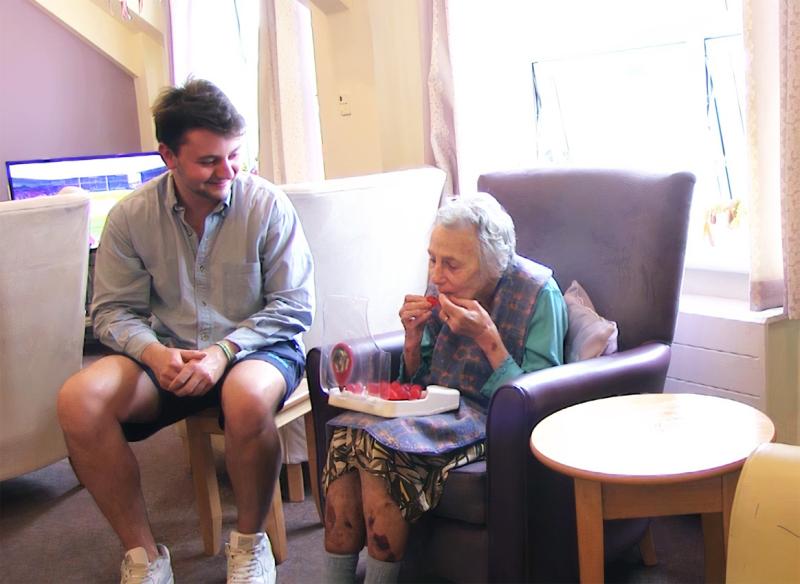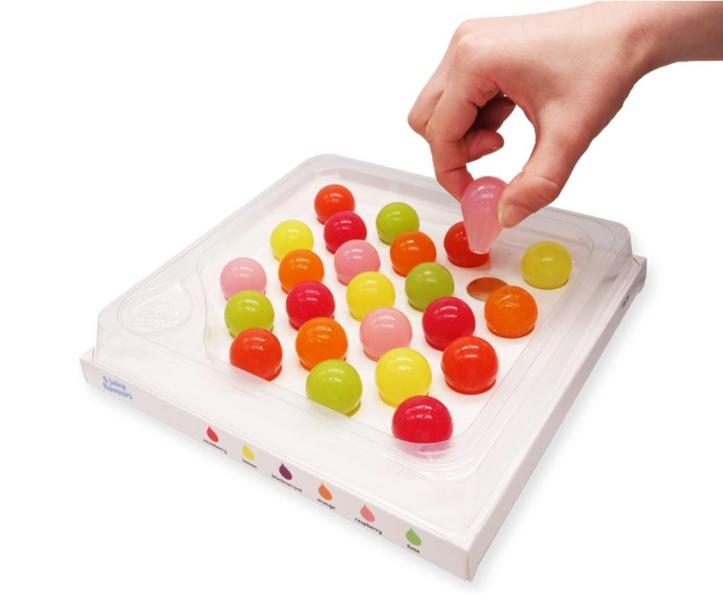Start-up creates sugar and gluten-free jelly drops to keep people with dementia hydrated
Lewis Hornby’s grandmother had been experiencing dementia for several years, but in 2018, she had a sudden health crisis that put her in the hospital. At first, the family thought it was a downturn in her condition, but the actual cause was severe dehydration. When given intravenous fluids, she bounced back.
At the time, Lewis was in a graduate programme in innovation design engineering at the Royal College of Art and Imperial College, in London. He did some research and learned that dehydration was a common problem for people with dementia.
He decided to try to find a solution to help his grandmother and people like her for his master’s project.
“Hydration is a massive health issue, not just for people living with dementia,” Lewis says. “Especially for people in care homes, about one in five are low-intake dehydrated.”
Lewis spoke to dementia specialists and learned that there are several reasons people with dementia often don’t drink enough.
“They may no longer equate drinking with quenching thirst, or recognise cups, or have the dexterity to use cups,” he says.
Lewis moved into his grandmother’s care home for a month to do research in person. “I realised that when I walk through the care home generally, residents would ignore me,” he says. “Fair enough. But if I had a box of chocolates, everyone is your best friend, and is taking a handful and speaking to you.”
Water in candy form
He took the idea of a box of sweets and applied his design expertise. He created a water-based, but solid, treat that would be served on a tray. Brightly coloured, teardrop-shaped, and easy to hold, the drops are 95% water, providing immediate hydration.
“When I initially presented them to my grandma, she ate about seven drops in 10 minutes, and I put up a video of her eating them online, and within a few weeks, it had over 100 million views and gone around the world,” he says.
The viral video led to appearances on BBC and Sky among other media in the UK. More than 50,000 people signed up to the website Lewis had created, and many wanted to try the product that he was still making in his kitchen.
It took 18 months working with food experts to get Jelly Drops ready for market.
Lewis and two cofounders created a company, calling the product Pattinson’s Jelly Drops. He modified his grandmother’s name, Pat Dickinson, to create the brand. She passed away in 2020, about the time the product went to market.

Since then, the London-based company has grown from three people to 16 and has produced more than five million Jelly Drops, which are in use in care homes in the UK and the United States.
Jelly Drops has been the recipient of numerous prizes for its innovation, including 2nd Prize in the 2019 Social Innovation Tournament, sponsored by the EIB Institute to promote solutions to social and environmental problems.
The company also won a £100,000 fellowship from the Alzheimer’s Society’s Accelerator Programme to help it scale up.
“The product itself is 95% water,” Lewis says, “we’ve added electrolytes, but it’s vegan, it’s sugar-free, it’s gluten free, natural colours, no artificial flavours. They’re fruity, sweet flavours. They’re solid all the way through so it’s not like an encapsulation of fluid,” meaning they’re easier to handle and there’s no risk of spilling.
A new version with vitamins
Each of the original drops contains 12.5 millilitres of fluid, and each tray holds 24 drops. The company also produces smaller containers called SnackPots that hold five 10 millilitre Jelly Drops. Each tray costs just under €7 euros, and the SnackPots, a little more than €1 each.

The company recently expanded to the United States and is working on reaching markets in Canada and other parts of Europe. The Jelly Drops research and development team is working on creating “Jelly Drops Plus,” which could add elements like vitamins and minerals, protein, and fibre.
Lewis says he’s still surprised by the rapid success, attributing it to finding a simple solution to a complex and widespread problem.
“In terms of the product itself, really it’s a delivery system in an engaging format that allows people to hydrate independently and with dignity,” he says. “Really, it’s just sweets, anyone can enjoy it.”
